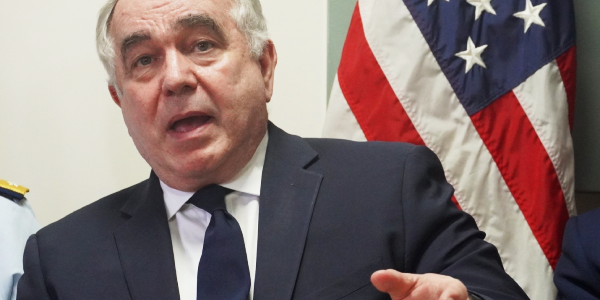The Deputy Assistant to the President and Coordinator for the Indo-Pacific, National Security Council, Kurt Campbell defends the security deal amongst Australia, UK and US as an effort to respond to a rapidly changing security environment in the Indo-Pacific region
THE new defense pact between Australia and the United Kingdom and United States, known as ‘AUKUS’ for short is an effort to respond to a rapidly changing security environment in the Indo-Pacific region.
The Deputy Assistant to the US President and Coordinator for the Indo-Pacific, National Security Council, Dr Kurt Campbell, uttered this in a press conference at the Heritage Park Hotel yesterday.
He was responding to a question that in Australia there were numerous letters to editor condemning the AUKUS deal as risky to regional security.
But Dr Campbell said UK and Australia are two of its close allies and partners committed to none nuclear policy.
“I think the view is AUKUS was an effort to respond to a rapidly changing security environment in the Indo-Pacific.
“It is not meant to be provocative. It is defensive and its goals are to secure peace and stability in the pacific, something that we believe is in the best interest of the all the people.
“I would also say that Australia and Great Britain are taking a pen to be open and transparent about the details associated with this initiative.
He said Australia strongly reassured its partners in the region of their determination to continue to adhere to the treaty of Rarotonga.
The Treaty of Rarotonga contributes to nuclear non-proliferation and disarmament by preventing the placement of nuclear weapons within the South Pacific by member states (Article 5).
“We support that and we also believe that it will be critical to continue to take steps to give us understanding of the people of the pacific,” Dr Campbell said.
According to plan, Australia will deliver the first Australian-built SSN-AUKUS to the Royal Australia Navy in the early 2040s, whilst the UK will deliver its first SSN-AUKUS to the Royal Navy in the late 2030s.
Soon after the deal was unveiled in San Diego, two former leaders in Australia, Malcolm Turnbull and Paul Keating, criticised the deal over its cost, complexity and potential sovereignty issues.
According to Reuters, Malcolm Turnbull said the project would take long and cost more than an alternative plan to buy conventional French, while Paul Keating called AUKUS the worst foreign policy mistake by the party since its failed bid to introduce conscription in World War One.
But the Australian Prime Minister, Anthony Albanese, defended the deal saying it was necessary given the buildup of Chinese military power in the region, which he called the largest since World War Two.
“China has changed its posture and its positioning in world affairs since the 1990s… that’s the truth of the matter,” he said.
China’s Foreign Minister also joined the two former Australian leaders saying Australia, UK and US are traveling ‘further down the wrong and dangerous path for their geopolitical self-interest.’
Spokesperson, Wang Wenbin said the latest joint statement issued by the US, UK and Australia shows the three countries have gone the wrong and dangerous path for their own geopolitics self-interest, completely ignoring the concerns of the international community. Dr Campbell left for Vanuatu after the Press Conference. He led an interagency delegation from the White House which held talks with the government.
BY CHARLES KADAMANA









